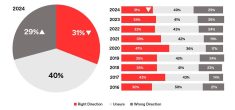Asian and Pacific countries are particularly vulnerable to the triple threat of food and fuel price volatility, climate change and the global economic crisis, a United Nations agency said March 26.
This is because the region has almost two-thirds of the world’s poor and half of its natural disasters, the UN Economic and Social Commission for Asia and the Pacific (ESCAP) said in a regional survey.
The emergence of all three crises at the same time has “hit the world’s poor the hardest, two thirds of whom live in the Asia-Pacific,” said ESCAP Executive Secretary Noeleen Heyzer.
Read Also

Mazergroup’s Bob Mazer dies
Mazergroup’s Bob Mazer, who helped grow his family’s company into a string of farm equipment dealerships and the main dealer for New Holland machinery in Saskatchewan and Manitoba, died July 6 from cancer.
“It is clear that a more inclusive model for economic growth is required to address their needs,” she said in a statement.
“This requires setting up social protection systems that increase income security and free up the spending power of middle-and lower-income people who drive the economy.”
The bigger role in the economy that many governments are taking through increased public spending because of the crisis offers them an opportunity to draw up development policies that are more inclusive and sustainable, ESCAP said.
ESCAP forecasts developing Asian economies will still manage to grow by 3.6 per cent this year after 5.8 per cent in 2008. But that masks wide regional variations, with China forecast to grow 7.5 per cent and Kazakhstan only 1.5 per cent.
But the developed economies of Japan, Australia and New Zealand will contract by a combined 2.2 per cent after growing 2.6 per cent in 2008, it said.
One of ESCAP’s functions is to promote economic and social progress in the region, and a UN official conceded that the forecasts, based on data at the end of February, could err on the optimistic side.
Asian countries have been particularly badly hit by the slowdown in global trade – forecast by the World Trade Organization to contract nine per cent this year – as demand shrivels in advanced economies.
While domestic demand is important in the larger Asian nations such as India, Indones ia and China, exports dominate small economies such as Hong Kong and Singapore.
“The fact is that the Asia-Pacific region is more economically integrated with the rest of the world than with itself,” Heyzer said.


















